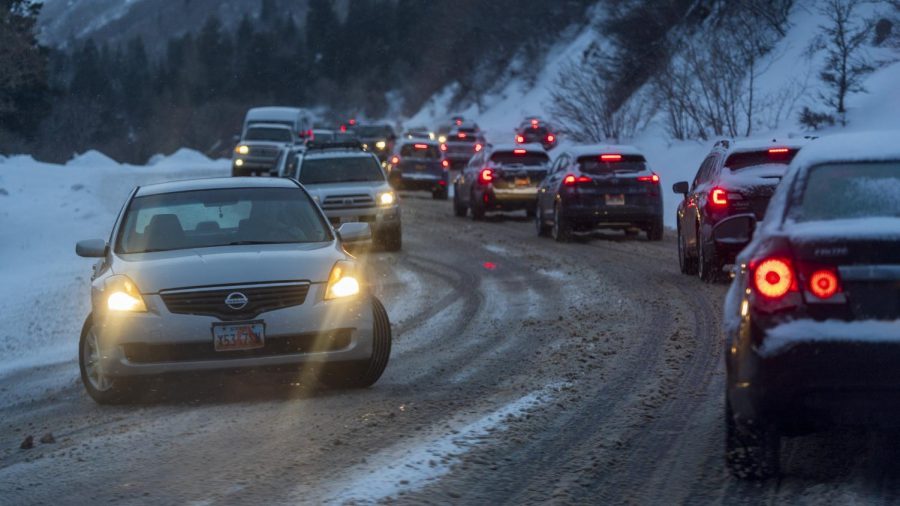Saifee: Pump the Brakes on EV Registration Fee Increases
Traffic in in Little Cottonwood Canyon outside Salt Lake City, Utah on Sunday, Feb. 10, 2019. (Photo by Kiffer Creveling)
February 13, 2021
Residents of the Salt Lake valley are no stranger to poor air quality. Inversions are commonplace — clouding the valley with a thick, dark smog that severely affects human health. Each year the Utah State Legislature seeks to tackle air quality policy and bolster bipartisan support behind air quality reform. However, this year a troubling bill has passed the House Transportation Committee and will soon be voted upon on the house floor.
Rep. Kay Christofferson and Sen. Wayne Harper’s bill, H.B. 209, proposes an increased annual and six-month vehicle registration fee for electric, hybrid, plug-in hybrid and clean energy vehicles. Though H.B. 209 proposes a rather small technical change to electric vehicle fees, it could have disastrous implications for Utah’s air quality and electric vehicle market. 57% of Utah’s pollution stems from mobile sources such as cars, so a bill like this would allow polluting cars to stay on the road. This bill is a step backward in pursuit of better air quality. It also stands in direct opposition to the nationwide stance on electric vehicles. The legislature should encourage the purchase and use of electric vehicles instead of increasing taxes for people who can afford to buy and use them.
If H.B. 209 passes, Utah’s electric vehicle registration rates will skyrocket. It would result in a five-fold increase in registration fees for electric vehicle owners, making Utah’s electric vehicle fees the highest in the nation. Prius, Tesla, Kia Soul and Nissan Leaf owners could see as much as a 150% increase in their registration fees. Even though a small percentage of people in Utah are electric car owners, a fee like this could inhibit those who are looking to purchase an electric vehicle in the future. Because of the pandemic, public transit ridership has plummeted by almost 50%. If there are more vehicles on the road, and there will be for the foreseeable future, Utah should encourage people to switch to electric or clean-energy-based vehicles instead of dissuading them.
We expect to see a bigger push for green vehicles and infrastructure like never before at a national level. Biden’s administration is prioritizing climate action through a green energy transition with plans to build 500,000 electric vehicle charging stations across the country in the next decade. He also wants to build better tax incentives for people purchasing electric vehicles. And as far as action goes, Biden recently announced that the federal fleet will switch to electric vehicles. Corporations are hopping on board this transition as well. General Motors, the largest automotive producer in America, is stopping the production of gasoline-powered vehicles by 2035. They also plan to invest 27 billion dollars into the electric vehicle industry.
Governor Spencer Cox’s “One Utah Roadmap” details ways in which his administration will be prioritizing sustainable growth at a local level. One of the goals is to transition our state’s fleet to zero and low emissions vehicles and continue investment in electric vehicle charging stations. In last year’s legislative session, bipartisan support approved a $50 million budget for electric vehicle infrastructure. These policies were passed because the legislature understands how important a clean energy transition is to better air quality and climate action. If H.B. 209 passes, it will undermine all of the previous bipartisan action taken to improve Utah’s economy and environment. Our investment in electric vehicle charging stations will be hindered if electric vehicle registration fees are too high for Utahns to consider purchasing electric vehicles.
It is highly unlikely that any college students will be pulling up to campus with a Tesla — we are far too tight on money for that. However, Prius, Kia Souls, and other electric or hybrid vehicles are commonplace. With the market making strides to make alternative fuel vehicles more affordable, we are bound to see more out and about. Grace Olscamp, a policy associate from HEALUtah, is worried about the H.B. 209 will affect an average citizen if it passes. “The general narrative about electric vehicle owners is that they all own Tesla’s, so what’s another $300 registration cost to them,” she said. “But in reality, most people are going to be buying a used $8,000 Nissan Leaf, and that $300 registration cost makes a big difference.”
Olscamp told me that this bill is “counterintuitive and counterproductive” to the state’s electric vehicle agenda and what’s good for Utahns. This bill is discouraging good behavior — purchasing environmentally-friendly vehicles — when what we need is incentivization. The best shot we have stopping the adoption of H.B. 209 is loud and strong public disapproval. If you want to fight for better air quality and a future-thinking economy, register for a virtual lobbying training and voice your concerns to your state legislators.













James Olin • Feb 21, 2021 at 1:05 am
I agree with this article. We need more electric vehicles on Utah road for a healthy environment for your grandchildren. We are no where near making a dent with electric vehicles in our area to worry about loss revenue for UDOT. This Bill 209 smells of political Bull for people in Utah who want our children to enjoy a clean environment that our grandparents enjoy. Some people see no solution and accept that future generations must endure more pollution.
Alice kay Watson • Feb 13, 2021 at 7:00 pm
I think this bill is pure stupidity. Why punish those who are trying to do their part for Utah clean air? Raise money other ways like going back to emissions testing. Put fines on the vehicles that spew extra pollutants into the air.